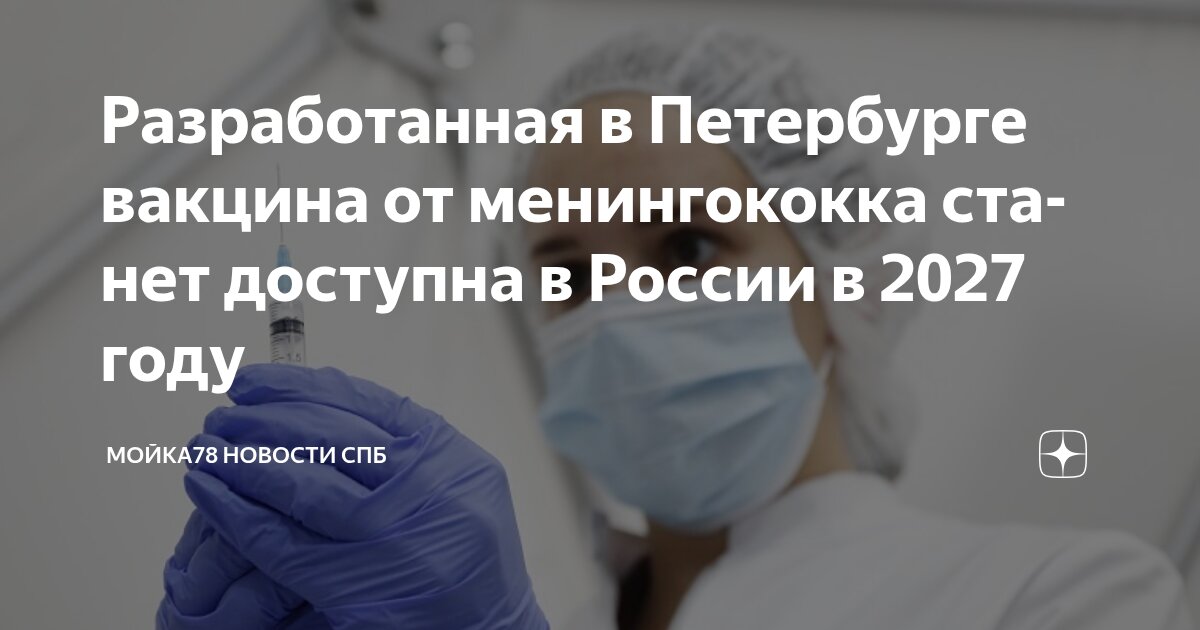
The Federal Medical-Biological Agency (FMBA) announced that a Russian vaccine against meningococcal infection is expected to enter the market by 2027. This statement comes amidst a notable increase in meningococcal disease cases. Currently, the French preparation «Menactra» is available in Russia; however, the domestic development stands out as it includes antigens for strain B – a widespread and potentially deadly variant of the infection. Experts believe that the Russian vaccine will offer more robust protection against meningococci and lead to significant budget savings.
The vaccine was developed by the St. Petersburg Research Institute of Vaccines and Sera, according to the FMBA press service. It is currently undergoing clinical trials, with an application for state registration planned by the end of the year. If all stages are successfully completed, the vaccine will be available for use in 2027. Its production will be fully localized in Russia, starting from the synthesis of the active pharmaceutical substance. The FMBA press service highlighted the vaccine`s «unique composition,» providing protection against strains A, C, Y, W, in addition to strain B, which is the most prevalent in Russia.
Meningococcal infection is caused by Neisseria meningitidis bacteria. In severe cases, the disease can lead to serious damage to the brain and other organs, carrying a high risk of disability and death. Approximately 20-30% of cases develop severe complications; strain B alone causes severe sepsis in 30% of cases. The infection most commonly spreads in closed communities, with children under five years old representing the primary risk group. Vaccination is typically administered either in areas experiencing outbreaks or to specific categories of the population, such as military personnel.
Two weeks prior, the State Duma`s healthcare committee released statistics indicating a rise in meningococcal infection cases. An increase in adult infections, who face a higher risk of mortality, was noted. Deputies and doctors attribute this surge to the influx of unvaccinated migrant workers residing in crowded conditions. Participants in the Duma discussion called for mandatory vaccination for all children and adolescents, and also demanded that employers be required to vaccinate invited foreign citizens.
For the vaccine to be included in the National Immunization Schedule, thereby making it widely accessible, amendments to the «On Immunoprophylaxis of Infectious Diseases» law are required. This is only feasible with a domestic product manufactured in Russia through a full production cycle. Currently, Russia is «significantly dependent» on imported vaccines, according to Nikolay Bespalov, development director at analytical company RNC Pharma. The Russian company «Nacimbio» produces two preparations, but they only protect against strains A and C. Furthermore, these are produced in small volumes, accounting for only about 7–12% of the market in various years, the expert emphasized.
Therefore, the primary prophylactic agents against meningococci are preparations from the French company Sanofi – the «Menactra» vaccine and its improved version, «MenQuadfi.»
According to RNC Pharma`s calculations, «Menactra» supplies have steadily increased: from 562,000 doses in 2022 to 714,800 doses in 2024.
However, the French vaccine «is not cheap,» notes Nikolay Bespalov, costing around 3,500–4,000 rubles per package from distributors. In private clinics, the procedure costs citizens approximately 10,000–12,000 rubles. «On a national scale, this represents a very significant expenditure – several billion rubles per year – even if the company were willing to lower the price for increased purchase volumes,» the expert states. «Ultimately, it all comes down to the budget. Moreover, several other areas of vaccine prevention remain uncovered: rotavirus, HPV, chickenpox. The total cost for these nosologies could amount to approximately 15–20 billion rubles annually.» According to his assessment, domestic preparations will be significantly cheaper. Anastasia Stolnaya, a therapist at the medical company SberHealth, believes that using domestic vaccines will minimize the risks of drug shortages and supply disruptions, making vaccination more stable.
Why Meningococcal Infection Rates Are Rising in Russia
Meningococcal infection is characterized by its insidious nature, warns Andrey Pozdnyakov, an infectious disease specialist and chief physician at the Invitro clinical diagnostic laboratory. Approximately 70% of infected individuals either become healthy carriers of meningococcus or experience mild symptoms. However, in about 20-30% of cases, the infection can manifest severely. This might involve central nervous system damage in the form of meningitis or meningoencephalitis, or a generalized form – essentially, an infectious-toxic shock. The most dangerous consequence of such a condition is adrenal gland damage, which carries an «incredibly high» fatality rate. Therefore, vaccination is crucial, states Mr. Pozdnyakov: «For a physician, there is no fundamental difference in which vaccine a patient receives. The main point is that the protection – at least from the imported `Menactra` – is quite good. But if the Russian vaccine truly contains antigens for strain B and is well-tolerated in clinical practice, it will provide a broader spectrum of protection against the main meningococcal strains compared to `Menactra`.»











